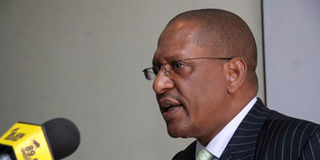Corruption squad set to probe IEBC

Director of public prosecution Keriako Tobiko speaking at a election forum at the Kenya School of Monetary studies on February 28,2013. The DPP has ordered the Ethics and Anti-Corruption Commission to investigate the procurement of election equipment. Photo/JENNIFER MUIRURI
What you need to know:
- Evidence supplied by the electoral commission showed that the failure of the Electronic Voter Identification and the Results Transmission Systems mainly arose from misunderstandings and squabbles within the commission during the procurement.
Heads could roll at the electoral commission after the Director of Public Prosecutions ordered the Ethics and Anti-Corruption Commission to investigate the procurement of election equipment.
In a letter to the ethics commission’s chief executive, Mr Halakhe Waqo Wednesday, Mr Keriako Tobiko said that the order was due to the recommendations of the Supreme Court that the Independent Electoral and Boundaries Commission officials involved in procurement irregularities be investigated.
On Wednesday, Supreme Court judges recommended the investigation and possible prosecution of electoral commission officials who may have been involved in impropriety during the procurement of electronic equipment.
In the detailed judgment on the presidential election petition, the judges said it was likely that the procurement of the electronic systems was marred by competing interests involving impropriety or even criminality at the Independent Electoral and Boundaries Commission (IEBC).
The judgment was giving details on why the court threw out the petition filed by Cord presidential candidate Raila Odinga and upheld the election of Mr Uhuru Kenyatta as President.
“We recommend that this matter be entrusted to the relevant State agency for further investigation and possible prosecution of suspects,” the judges said.
Evidence supplied by the electoral commission showed that the failure of the Electronic Voter Identification and the Results Transmission Systems mainly arose from misunderstandings and squabbles within the commission during the procurement.
The investigation is to target the procurement of Electronic Voter Identification Devices and the Results Transmission System, which stalled during the March 4 elections rendering the electoral process questionable and doubtful.
The anti-corruption commission is investigating the controversial procurement of Biometric Voter Registration kits previously billed at Sh3.9 billion. The procurement collapsed and the 15,000 kits that were bought through a government-to-government deal between Kenya and Canada were supplied by a French aeronautical firm, Safran Morpho, at a cost of Sh9 billion.
“This is, therefore, to request the commission in terms of its constitutional and legal mandate to consider the aforementioned recommendations of the Supreme Court of Kenya with a view of undertaking appropriate investigations,” Mr Tobiko said.
He also told the anti-corruption chief to supply his office with the final report, findings and recommendations as soon as investigations are concluded.
Yesterday, the IEBC election committee chaired by commissioner Yusuf Nzibo was still holding a meeting at the hotel InterContinental to lay the ground for its own internal audit of the conduct of the March 4 elections.
The 5,000 voter identification machines were to be used for speedy identification of voters while the results were to be transmitted using gadgets from the 34,000 polling centres.
An internal memo by the commission’s head of IT, Mr Dismas Ong’ondi, warned the commission of the risks posed by the kits, also referred to as e-poll books, which were to be supplied by a South African firm.
In a letter dated December 6, 2012 and addressed to Mr Wilson Shollei, the Deputy Commission Secretary (Support Services) and copied to the CEO, Maj (Rtd) James Oswago, Mr Ong’ondi advised the election team not to award the kits tender to Face Technologies because of the risk that the equipment on offer might not work.
Mr Ong’ondi had warned that the kits required more time and a parallel technology for them to function optimally. He also warned that the device to be supplied by Face Technologies was different from the concept model and the one initially proposed.
“Considering the strict timelines, this will give the commission very limited time to carry out the necessary configurations, testing and deployment to all the polling stations in the country,” he said.
Yesterday, IEBC said it welcomed calls for investigations as ordered by the Supreme Court and promised to cooperate with the investigating agencies.



